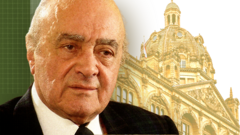In those manic first mid-May days after taking over as spent more time on the move than stationary. “Where am I?” the American paused when reached by the Star one night. “I, uhhh, just made it to Mallorca, actually.
” Turns out that whirlwind was just a palate teaser. Across Europe this weekend, men’s club seasons are kicking off in the usual swirls of anxious expectation, blind hope and a continent’s worth of unknowns. It officially began with inevitably won by Real Madrid.

This much we do know, however: Marsch’s air miles and Eurorail card are in for a torrid time. From England to Spain to France, Germany, Italy and well beyond the big five, this is shaping up to be the most Canadian season of European soccer that we have seen. With a home World Cup on the horizon in less than two years, it’s also likely to be the most consequential in the history of the men’s national team.
How so? Why so? Questions are understandable. If Marsch’s first week in charge was logistically chaotic, an all too familiar institutional mayhem again descended on Canadian soccer in the five weeks since a The which engulfed the women’s program at the and (temporarily for now) brought the national federation back into familiar darkness, although somewhat offset by the raw defiance of the players, who defied extreme punishment to progress in Paris. Light, however, is found elsewhere in France and wider Europe, where club sides across the continent have opened chequebooks and splurged on Canadian talent at an unprecedented rate.
Of the 26 players Marsch took to Copa America, seven have already been transferred to new teams with over 40 million euros (about $60 million Canadian) spent in transfer fees. There’ll perhaps be more before the transfer window closes in two weeks. The futures of the most prized Canadian talents — and — remain undefined.
While many of the instant impacts of Canada’s unlikely Copa run were clear (a financial boon, national imagination captured), potentially program-changing effects for the longer term are already being realized. Marsch put his trust in some untested players, giving them a shop window. Europe’s clubs clearly liked his wares.
The manager is now rewarded, too: As he plans his 2024-25 scouting calendar, the French Riviera will be his most frequent destination. Olympique de Marseille acted fast when it spent about $26 million during the Copa, the marauding midfielder still in the midst of a stellar tournament. Two weeks ago, the French club added defender Derek Cornelius for $7.
5 million. If Koné was Canada’s most impressive Copa America performer, was arguably more crucial. The heart of Canada’s rearguard has been a consistent weakness for too long.
Marsch’s new pair were revelatory, making an instant connection which will now stretch down the Riviera with Bombito about to complete his switch from MLS side Colorado to Nice for around $10.5 million. He won’t be signed in time for Sunday’s Ligue 1 opener against Auxerre, which brought in compatriot Theo Bair, the striker leaving Scotland’s Motherwell for $3.
8 million. French football may have this summer, but from a Canadian perspective Ligue 1 will be appointment viewing. (For good measure, MLSE chair Larry Tanenbaum completed his purchase of storied outfit Saint-Étienne this summer.
) Settling in at a giant club such as Marseille won’t be simple; Koné and Cornelius are part of a major overhaul there. But the club’s slick social media parading of its new Canadian stars showed a duo at ease, hungry to get going. “The objective is very clear.
This is a club that must aim to win Ligue 1,” Koné told local reporters. “I’m looking forward to discovering Ligue 1 ..
. but I see it as a starting point, not an end,” Cornelius insisted. A new start has already begun for winger Liam Millar, who swapped Basel and Switzerland for England’s ambitious Hull City.
The Swiss league won’t be short of Canadians, though. Defender Zachary Brault-Guillard has settled instantly at Lugano, while former CF Montreal teammate Mathieu Choinière looks poised to join him, moving to Grasshopper Zurich. For Marsch and his staff, this frenzied movement must feel tantalizing.
Seeing his players tested at higher levels and expanding the talent pool were identified as post-Copa keys. Scoring remained a bugbear all tournament. Three towering strikers with dual-national eligibility have joined top-flight European sides: Daniel Jebbison to English Premier League Bournemouth, Promise David to Union SG in Belgium and Luka Kulenović to Dutch newcomer Heracles.
But there’ll be caution, too. Game time is essential. No good stepping up to face Europe’s elite if you’re watching from the bench.
The progress or otherwise of vice-captain Steph Eustáquio at Porto and recuperating winger Tajon Buchanan, mercifully a short commute from Marsch’s Tuscany home at Inter Milan, will be closely watched. Positively, precocious defender Luc de Fougerolles spent the pre-season with the first team of his Premier League side, Fulham. The futures of Davies and David will be monitored.
With both entering the final year of contracts at Bayern Munich and Lille, respectively, sitting tight could reap huge free-agent deals by January. Before then, there’s still time for other international teammates to join them. Jacob Shaffelburg’s Copa heroics were surely enough to attract suitors.
In three weeks, Canada comes together again for friendlies against 2026 World Cup co-hosts U.S. and Mexico.
The Americans are on the verge of tasked with harnessing a squad brimming with European-based talent. These hectic weeks of transfer movement have now given Marsch, already thriving, a similar luxury..



















